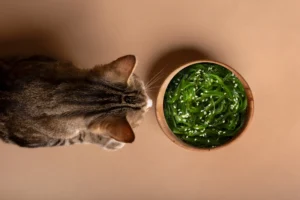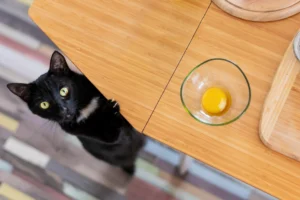Disclaimer: Always check with your vet on what “human topical treatments” your cat can and cannot use as information may vary based on their medical needs and health conditions.
As pet owners, we always want the best for our feline companions, especially when they have minor injuries or skin irritations. It’s tempting to reach for human creams and sprays that we use ourselves, thinking they might offer relief for our cats.
However, many common topical treatments contain ingredients that are not only unsuitable but outright dangerous for cats. Unlike humans, cats groom themselves constantly, meaning anything applied to their skin can quickly be ingested—leading to potential toxicity.
This is our 2nd article exploring the human creams and sprays that should never be used on cats and why they pose a risk to their health.
Here are some situations where you should NOT be using human topical creams on your cat:
The cream contains harmful ingredients
like menthol, salicylic acid, or fragrances that can be toxic to cats when ingested or absorbed through their skin.
The cream is designed for specific purposes
like dry skin, acne, or rashes, which may not be suitable for your cat's specific skin issues, leading to irritation or adverse reactions.
The cream is scented or has chemicals
as cats are more sensitive to fragrances and chemicals, and human products may cause respiratory issues, skin irritation, or allergic reactions in cats.
The cream is not veterinarian-approved for animals
as some human creams might have high concentrations of active ingredients that are too strong for cats.
Your cat has a wound or injury
because cats often lick or groom themselves, and applying human creams to wounds can lead to ingestion of harmful substances or infection.
Your cat has sensitive or irritated skin
as human products can worsen skin irritation, leading to further discomfort, allergic reactions, or infections.
Your cat has underlying health conditions
like liver or kidney issues, or other health problems, and may not process the ingredients in human creams effectively, which could cause harm.
For safe and effective treatment, it’s best to consult your vet to get topical products formulated specifically for pets.
Read on to learn whether we should be using human topical creams on our cats and which is safe or will do more harm than good.
Table of Contents
1. Calamine Lotion
Is Calamine lotion safe for cats?
No, calamine lotion is not safe for cats. It contains zinc oxide, which is toxic to cats if ingested, and cats are likely to lick it off their skin. Zinc toxicity can cause symptoms such as vomiting, diarrhea, lethargy, and in severe cases, anemia or organ damage.
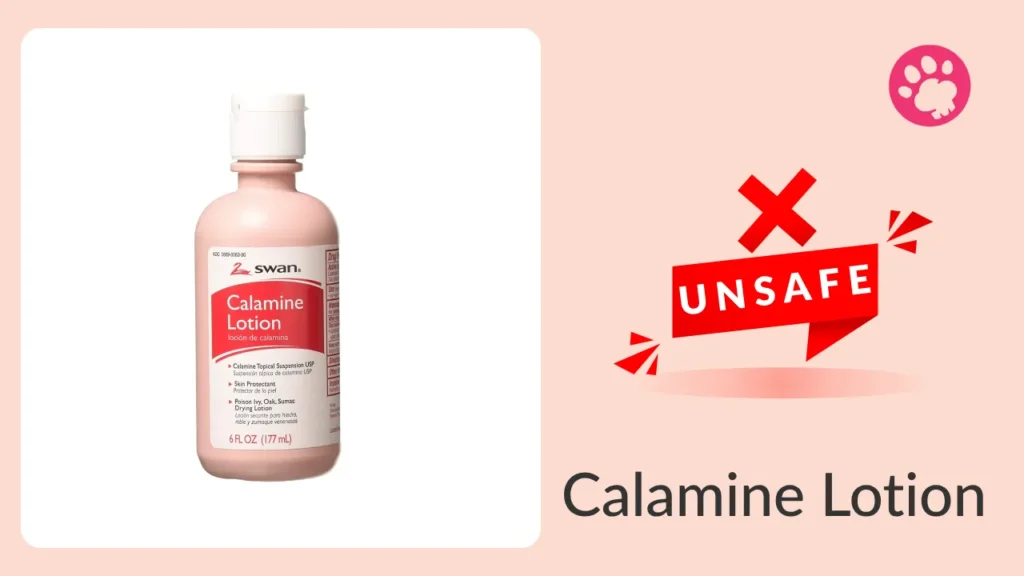
Some safer alternatives for soothing cat’s itchy or irritated skin include:
Vet-approved hydrocortisone creams
Oatmeal-based shampoos or sprays made for cats
Aloe vera gel (pure and unscented) used in small amounts on minor irritations (make sure your cat doesn’t lick it off)
Coconut oil (a thin layer) to moisturize dry or flaky skin
Cool, damp compress to relieve irritation
Diluted chlorhexidine or povidone-iodine solution with a vet’s approval
Always consult your veterinarian to ensure the treatment is safe and addresses the underlying cause of the issue.
2. Antiseptic Spray & Creams
Are antiseptic sprays safe for cats?
No, human-grade antiseptic sprays and creams are generally not safe for cats unless explicitly approved by a veterinarian. Many contain harmful ingredients like alcohol, phenols, hydrogen peroxide, or fragrances that can irritate a cat’s sensitive skin, cause burns, or be toxic if ingested during grooming.
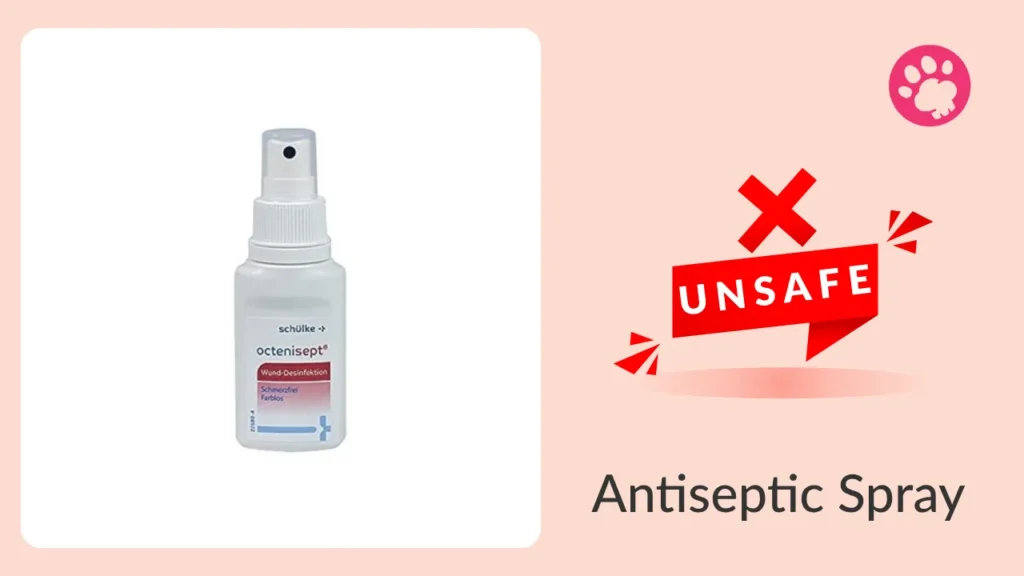
Some safe alternatives include:
- Diluted chlorhexidine (0.05%)
- Diluted povidone-iodin
- Manuka honey dressings
3. Dettol
Is Dettol safe for cats?
No, Dettol is not safe for cats. Dettol contains phenols, which are highly toxic to cats because their livers cannot effectively process these compounds.
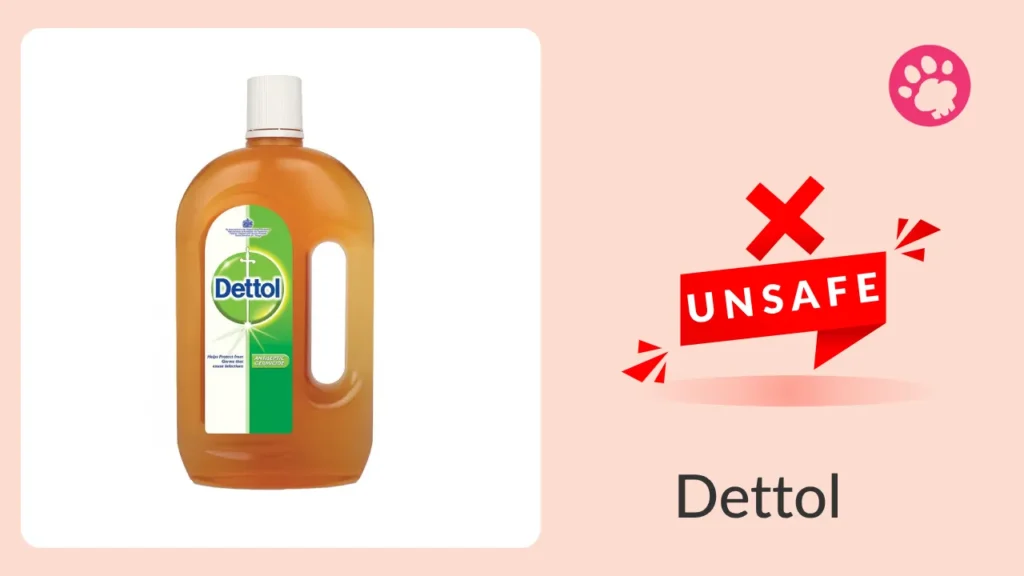
Exposure to Dettol – whether through skin contact, ingestion, or inhalation – can cause:
- Skin irritation or burns
- Vomiting and drooling (if ingested)
- Lethargy or difficulty breathing
- Severe toxicity leading to organ damage
For disinfecting areas or cleaning wounds, use:
- Diluted chlorhexidine (0.05%)
- Diluted povidone-iodine
- Vet-approved antiseptic sprays or solutions.
Always keep phenol-based cleaners like Dettol away from your cat and consult your vet for safe wound care or cleaning products.
4. Savlon
Is Savlon safe for cats?
Savlon (which contains chlorhexidine and cetrimide) is not recommended for use on cats unless specifically prescribed by a veterinarian. While chlorhexidine is often safe for pets in dilute forms, the other ingredients in Savlon, such as cetrimide, can be irritating or toxic to cats.
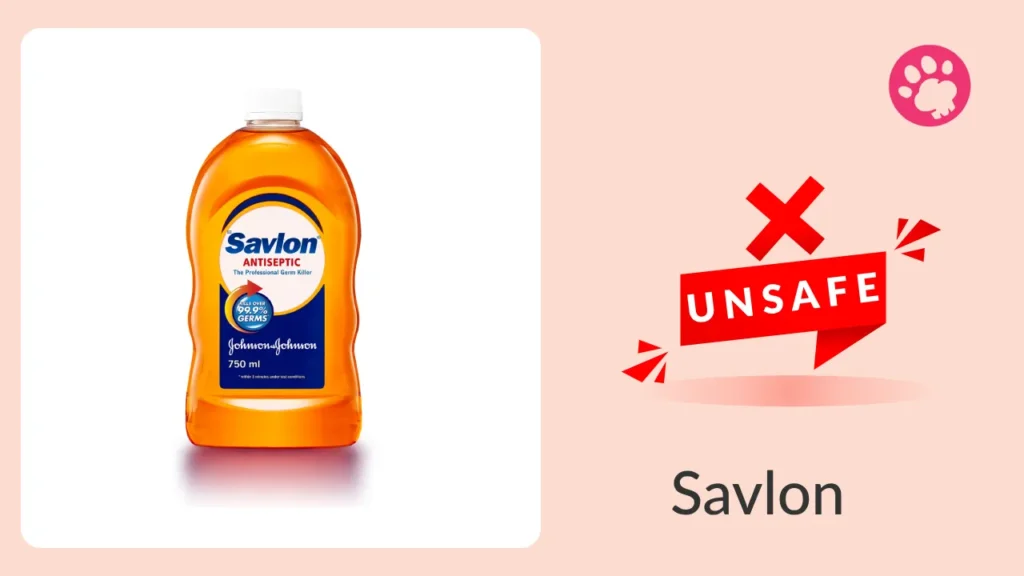
Some risks that come with using Savlon on your cat include:
Toxicity
some formulations of Savlon may contain ingredients that are harmful if ingested by cats, especially since they tend to lick treated areas.
Skin irritation
Certain ingredients, like cetrimide, can cause irritation or adverse reactions in cats' sensitive skin.
For minor cuts, wounds, or infections, consult your vet for safe pet-specific antiseptics, such as diluted chlorhexidine or povidone-iodine, which are safer and more commonly recommended for cats. Always consult your vet before applying any human antiseptic products to ensure safety.
5. Germolene
Is Germolene safe for cats?
No, Germolene is not safe for cats unless specifically advised by a veterinarian. Germolene is an over-the-counter antiseptic cream commonly used for treating minor wounds, cuts, grazes, insect bites, and stings in humans.
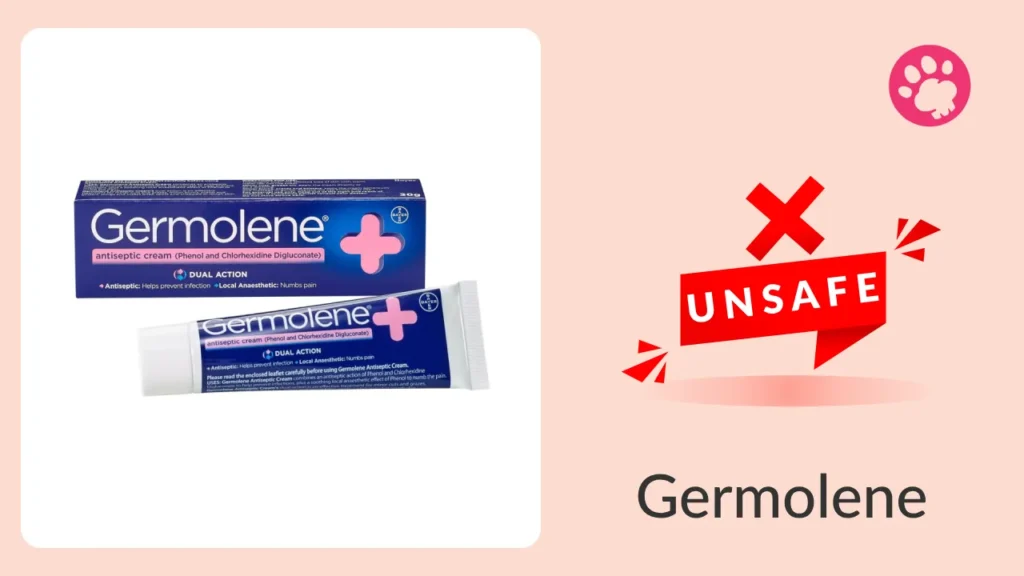
It contains ingredients like phenol, chlorhexidine, or local anesthetics, which can be toxic to cats if ingested or absorbed through the skin. Cats are highly sensitive to phenols and may lick the treated area, increasing the risk of toxicity.
Some safe alternatives include:
Diluted chlorhexidine (0.05%)
Diluted povidone-iodine
Manuka honey dressings
If in doubt, always consult your vet to ensure proper treatment and safety.
6. Vicks VapoRub
Is Vicks VapoRub safe for cats?
Vicks VapoRub is not safe for cats. It contains menthol, eucalyptus oil, and camphor, which are highly toxic to cats, even in small amounts. Cats are especially sensitive to essential oils and menthol, and exposure to Vicks VapoRub can lead to severe toxicity.
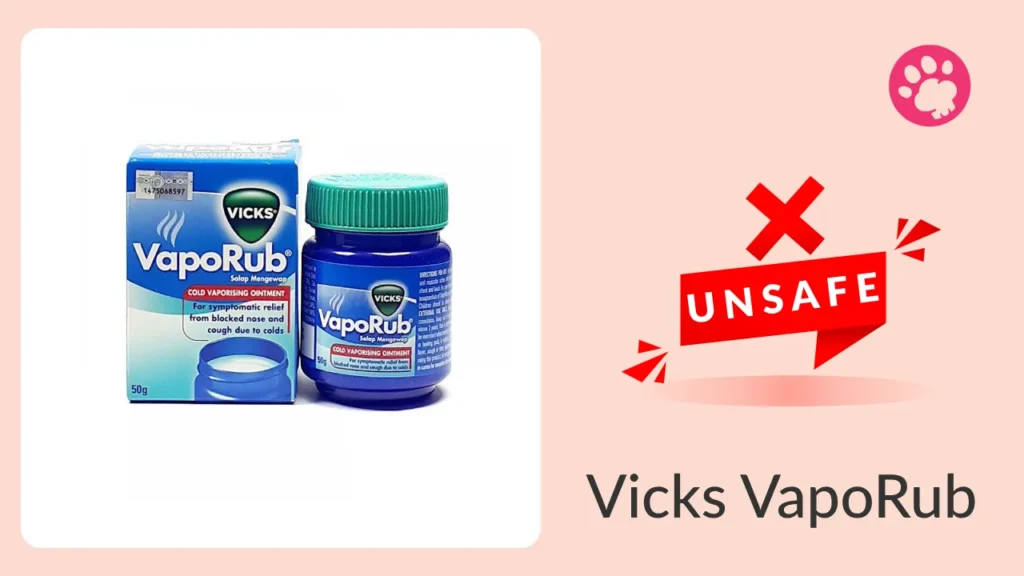
Symptoms of poisoning may include drooling, vomiting, lethargy, difficulty breathing, tremors or seizures.
Cats can also absorb these ingredients through their skin, and they may lick the affected area, ingesting the toxic substances.
If you’re concerned about your cat’s health or respiratory issues, it’s best to consult a veterinarian for safe treatments. Never use products like Vicks VapoRub on pets.
How Petchef helps avoid health issues for your cat
When it comes to itchiness, rashes, hot spots and other skin problems, many of those are attributed to negative and/or allergic reactions to artificial ingredients in commercial cat food, especially kibbles.
Which is why at Petchef, we ensure that all the ingredients that go into our cat food recipes are made of fresh, clean ingredients only! All the meals tailored for cats contain:
80%+ meat (chicken, buffalo, beef, salmon, tuna, duck, etc)
10%+ freshly cooked moisture
7% veggies, herbs and oils
It’s completely free of preservatives, additives, fillers and grains! If you’d love for your cat to eat the food they were born to eat, come have a chat with our friendly pet nutritionist to find the ideal meal for your pet. Or sign up on our site directly and order a batch of food for to try for 2 weeks.
7. Tiger Balm
Is Tiger Balm safe for cats?
No, Tiger Balm is not safe for cats. It contains ingredients like menthol and methyl salicylate (a compound similar to aspirin), which can be toxic to cats. Cats have a much lower tolerance for these substances, and exposure to Tiger Balm can lead to toxicity (symptoms include drooling, vomiting, difficulty breathing, lethargy or seizures) and skin irritation.
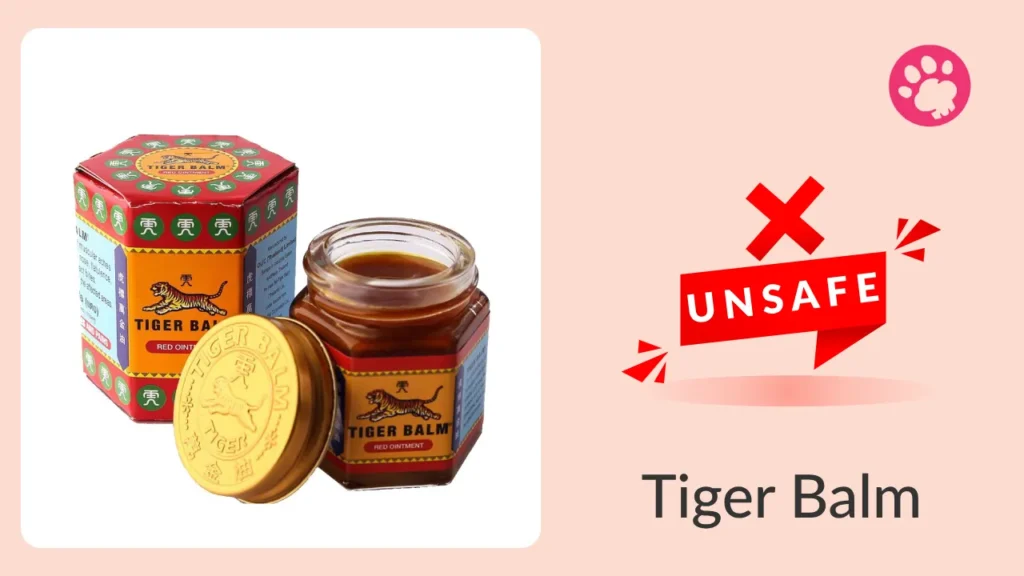
If your cat is experiencing pain or discomfort, consult a veterinarian for safe, cat-specific treatments. Never use human topical products like Tiger Balm on pets.
8. Cicatrizant products
Are Cicatrizant products safe for cats?
The safety of cicatrizant products (wound-healing creams or sprays) for cats depends on their specific ingredients. Many cicatrizant formulations are made for human use and may contain substances like alcohol, essential oils, or preservatives that are not safe for cats and could cause irritation, toxicity, or allergic reactions.
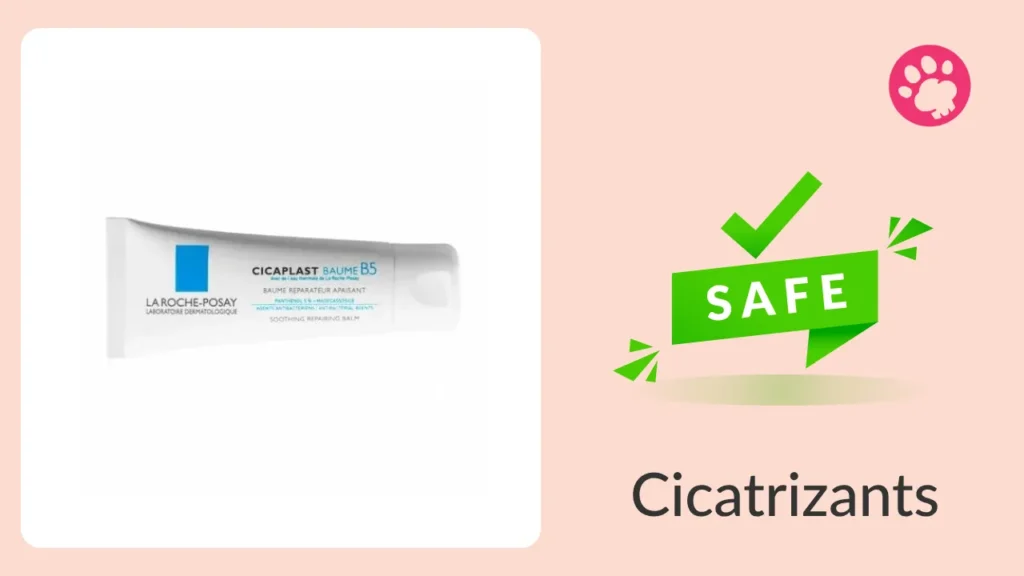
Safer alternatives for wound healing in cats include:
Veterinarian-recommended wound sprays
Pet-safe options like chlorhexidine or povidone-iodine (properly diluted).
Aloe vera gel (pure and unscented)
Helps soothe minor wounds (ensure it’s free of aloin, which can be toxic).
Honey-based wound dressings
Medical-grade manuka honey can help heal wounds naturally.
Antibacterial ointments
Vet-approved products designed for cats.
9. Shea butter
Is Shea butter safe for cats?
Shea butter is generally safe for cats when used sparingly and in small amounts, but it’s important to follow a few guidelines:
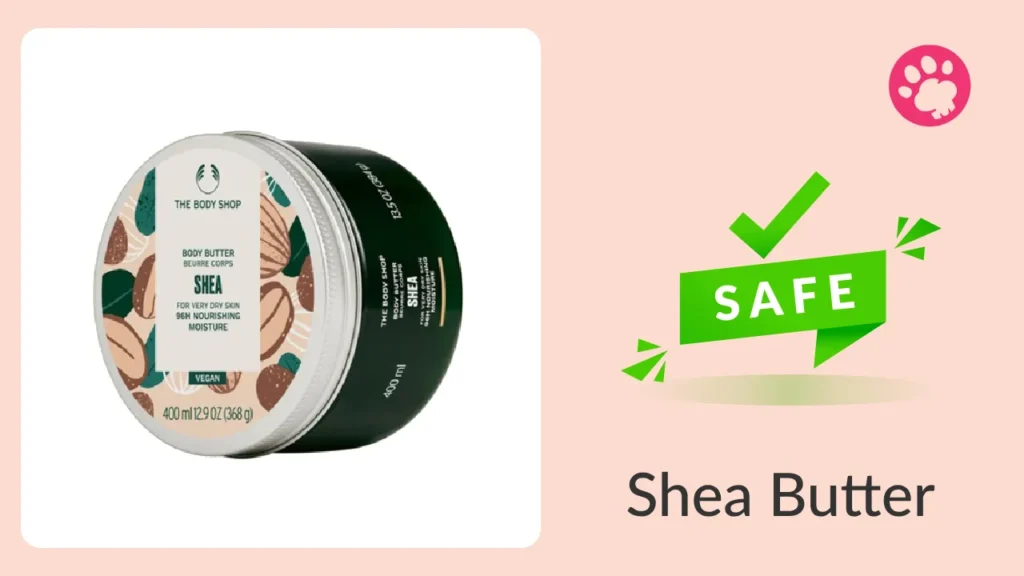
Moisturising
Shea butter can be soothing for dry or irritated skin, and is typically safe when applied to small, localized areas like dry paws or elbows.
Ingestion risk
Cats may lick treated areas, so it’s essential to monitor them to avoid them ingesting the butter, which could lead to stomach upset or mild gastrointestinal discomfort if consumed in large amounts.
Fragrance-free
Ensure the shea butter is unscented and free from added essential oils, which can be toxic to cats.
While shea butter itself is non-toxic, always consult with your vet before using it, especially if your cat has sensitive skin or any pre-existing conditions.
10. Human lotions
Are human Lotions safe for cats?
No, human lotions are generally not safe for cats. Many human lotions contain ingredients that can be harmful or toxic to cats if absorbed through the skin or ingested during grooming.
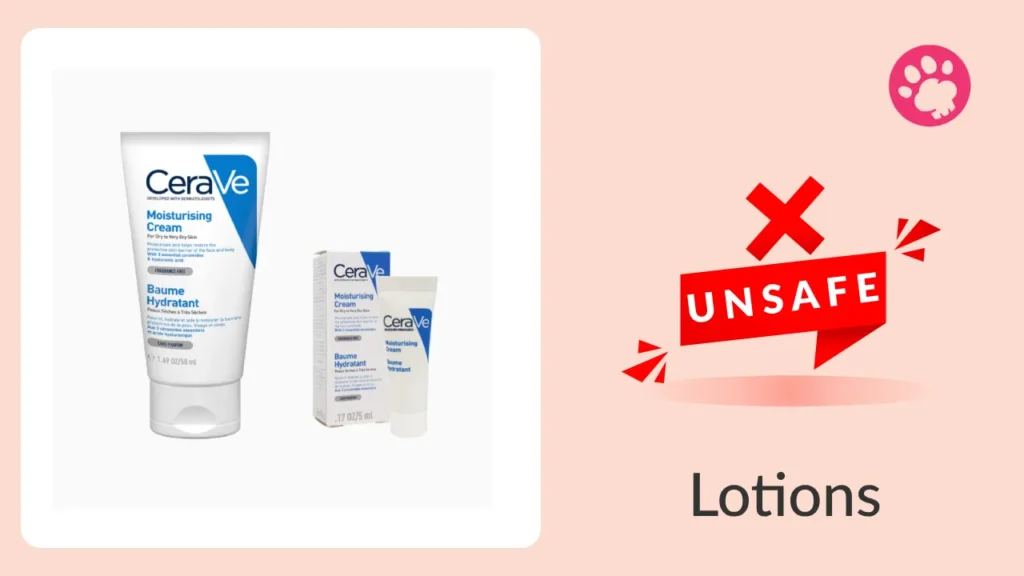
These harmful ingredients may include:
- Fragrances and essential oils: can irritate a cat’s skin or cause toxicity.
- Parabens or preservatives: potentially harmful to their sensitive systems.
- Alcohol or menthol: can dry out their skin or cause irritation.
- Sunscreen agents like zinc oxide: toxic to cats when ingested.
Some safer alternatives include:
Vet-approved moisturizers
Specifically formulated for cats, such as balms for dry skin or paws.
Pure coconut oil
Apply sparingly to small dry areas (with vet approval).
Oatmeal-based sprays or shampoos
Soothing and safe for cats.
Always consult your vet before using any product on your cat to ensure it’s safe and appropriate.
Conclusion on using human creams and sprays on cats
When it comes to treating your cat’s skin issues, reaching for human creams and sprays can do more harm than good. Many contain toxic ingredients that can lead to poisoning, irritation, or even long-term health problems. Instead of risking your cat’s well-being, always consult your veterinarian for safe, pet-friendly alternatives. Remember, what works for humans isn’t always safe for our feline friends, and a little precaution can go a long way in keeping your cat happy and healthy.
If the cream you’re planning to use is not on this list, read our first article on Human Topical Treatments for cats as well.
If you’re unsure or the issue doesn’t improve, it’s always a good idea to consult your vet for further guidance.





